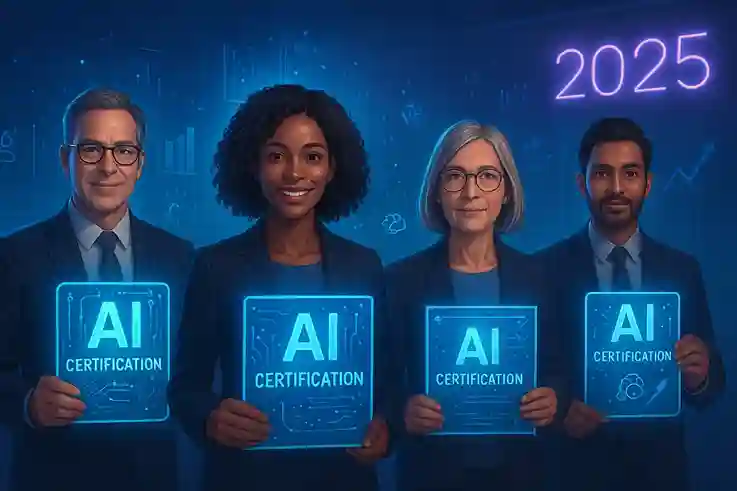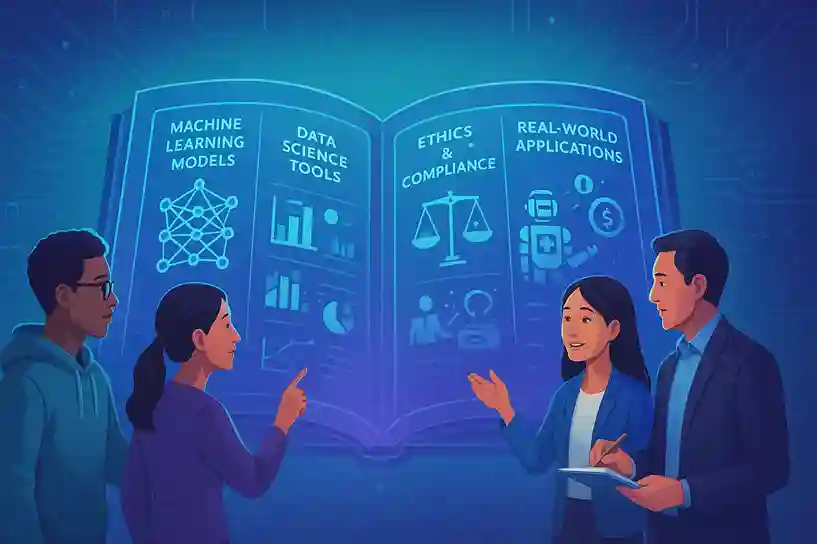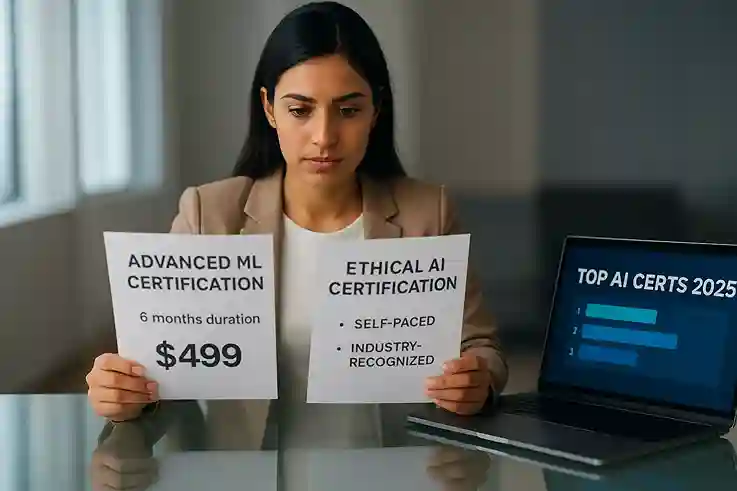AI Certifications That Give You a Real Edge
AI certifications are becoming one of the fastest ways to gain in-demand technology skills. As artificial intelligence continues to shape industries from healthcare to finance, employers are actively seeking professionals who understand its principles and applications.
You don’t need a computer science degree to begin this journey. Many AI certifications are designed for both new graduates and experienced professionals looking to shift their career path. They offer a structured, focused approach that can quickly build your technical knowledge while providing hands-on learning opportunities.
In this guide, you’ll discover exactly what AI certifications are, the types available, and who can benefit from them. You’ll also explore why they matter in today’s competitive job market and how they can help you stand out. Whether your goal is to upskill, change careers, or simply stay ahead of the curve, these programs can strengthen your expertise, boost your confidence, and expand your professional opportunities.
Why AI Certifications Matter in 2025

Artificial intelligence is no longer a niche technology—it’s embedded in industries from healthcare and finance to retail, logistics, and marketing. Businesses are using AI to improve efficiency, uncover insights, and create innovative products and services.
As adoption accelerates, so does the demand for professionals who can work with AI tools, analyze data, and build intelligent solutions. Yet, not everyone has the resources or time to pursue a full university degree in computer science or data science.
AI certifications bridge that gap. They offer a focused, time-efficient path to acquiring relevant skills, from machine learning basics to applied AI techniques. These programs also validate your capabilities, giving employers tangible proof of what you can do.
In 2025, more organizations are actively valuing AI certifications when assessing candidates. For many hiring managers, they signal both technical competence and the initiative to keep up with a fast-changing field. In a competitive market that prizes speed and specialization, this can be a decisive advantage for your career.
Who Should Consider AI Certifications?
AI certifications are not limited to engineers or coders. They’re designed for anyone looking to grow in today’s technology-driven job market.
For Recent Graduates
If your degree isn’t in computer science, AI certifications can give you a competitive edge in today’s crowded job market. They provide targeted training that focuses on the skills employers actually need—such as working with AI tools, analyzing data, and understanding machine learning concepts. This means you can showcase practical, job-ready abilities that go far beyond your academic background, making you stand out even if your formal education is in a different field.
For Working Professionals
Professionals in marketing, finance, operations, and other fields are increasingly adopting AI tools to streamline workflows, uncover insights, and make faster, data-driven decisions. As these technologies become central to daily operations, the ability to use them effectively is turning into a core career skill. AI certifications offer a structured, efficient path to reskill, ensuring you stay relevant in your industry. They also help you transition from simply using AI tools to strategically applying them—making you more valuable to your organization and opening the door to higher-level opportunities.
For Career Changers
If you’re moving into tech from another field, AI certifications can provide the roadmap you need to make the transition smoother. These programs guide you through the essentials, from understanding core AI concepts to applying them in practical, real-world scenarios. Many include hands-on projects, mentorship, and peer support, which can be especially valuable when you’re building confidence in a new domain. By the time you complete the certification, you’ll have both the knowledge and portfolio evidence to position yourself as a credible candidate in a fast-growing, opportunity-rich sector.
For Anyone Seeking Growth
Whether your goal is higher pay, stronger job security, or access to new career opportunities, AI certifications can be a powerful stepping stone. They demonstrate to employers that you’re proactive about your growth and willing to adapt to emerging technologies. In a job market where innovation moves quickly, those qualities—initiative and adaptability—often carry as much weight as technical expertise. By earning a certification, you’re not just proving you can learn new tools; you’re showing you can evolve with the industry itself.
What You’ll Learn from a Quality AI Certification
A strong AI certification goes beyond theory. It builds practical skills that employers value and use every day.

Foundational AI Knowledge
Most AI certifications begin by establishing a solid foundation in the essentials. You’ll explore how algorithms drive decision-making, how automation streamlines processes, and how data fuels every AI system. From there, the curriculum typically introduces you to core disciplines such as machine learning, deep learning, and neural networks—explaining not just what they are, but how they work and where they’re used. This early groundwork ensures you have the context and vocabulary to tackle more advanced AI concepts later in the program.
Hands-On Tool Training
In most AI certifications, you’ll gain hands-on experience with the same tools and programming environments used by professionals in the field. This often includes learning Python for coding AI models, using TensorFlow for building and training neural networks, and applying scikit-learn for machine learning tasks. Some programs also introduce APIs from platforms like OpenAI, giving you the skills to work with natural language processing or generative AI systems.
If you’re new to programming, many beginner-friendly courses guide you through each step, breaking down complex processes into manageable lessons so you can build confidence as you go.
Real-World AI Applications
Quality AI certifications connect technical skills to real-world impact by showing you how artificial intelligence drives everyday innovations. You’ll see how chatbots deliver instant customer service, how image recognition systems classify and detect objects, how fraud detection algorithms flag suspicious transactions, and how recommendation engines personalize shopping or content experiences.
By studying these use cases, you’ll gain insight into both the underlying technology and the strategic value it creates for businesses. This dual perspective—technical know-how plus business understanding—makes you more effective and versatile in any AI-related role.
Practical Projects and Portfolios
The best AI certifications go beyond lectures by including hands-on projects, detailed case studies, and portfolio-building exercises. These practical components allow you to apply what you’ve learned to real-world scenarios, reinforcing your skills through active problem-solving. By the end of the program, you’ll have tangible proof of your abilities—completed projects, documented solutions, and code samples—that you can present to potential employers. This portfolio not only validates your technical competence but also shows that you can translate theory into results, a quality hiring managers value highly.
Ongoing Assessment and Support
Some AI certifications include additional support features such as quizzes, graded assignments, and even one-on-one mentorship. These elements create a structured learning experience that keeps you engaged and accountable throughout the program. Quizzes and graded tasks reinforce key concepts, while mentorship provides personalized guidance, feedback, and industry insights. This combination not only helps you retain what you’ve learned but also builds your confidence in applying those skills to real-world challenges—making the transition from training to professional work much smoother.
Job-Ready Skills with Proof
By the end of a quality AI certification, you’ll have more than just an understanding of key AI concepts—you’ll have demonstrated, practical evidence of your abilities. From completed projects and case studies to experience with industry-standard tools, you’ll possess proof that you can apply AI solutions to real-world challenges. This combination of knowledge and verified skill is exactly what employers look for, giving you a clear advantage in the job market.
How AI Certifications Can Give You a Real Edge
In today’s crowded job market, skills alone aren’t always enough—you also need credible proof of your expertise. That’s where AI certifications make a difference. They demonstrate to employers that you’re not just curious about artificial intelligence—you’ve invested the time, effort, and discipline to master it. A certification acts as a trusted signal of both your knowledge and your commitment, setting you apart from candidates who may talk about AI but haven’t taken concrete steps to learn and apply it.
They Build Credibility Instantly
An AI certification signals to hiring managers that you’re serious about your career. It shows that you’ve invested time in learning complex concepts like machine learning, algorithms, and data modeling. It’s a clear message: you don’t just talk about tech—you’ve taken real steps to understand and apply it.
They Help You Stand Out in Competitive Fields
Jobs in AI, data science, and analytics are growing quickly—but so is the competition. When resumes start to look alike, an AI certification can be the factor that sets you apart. It shows you have current, relevant skills in a field that’s evolving rapidly.
They Strengthen Your Interview Game
AI certifications give you real stories to share in interviews and networking. You can talk about the models you built, the tools you used, and the challenges you tackled. Instead of saying, “I’m learning AI,” you can confidently say, “I built a sentiment analysis tool using Python and natural language processing.”
They Boost Confidence—Internally and Externally
You don’t have to feel like an outsider in tech. AI certifications provide structured learning, clear goals, and helpful feedback that build both skill and confidence. When you’re certified, you walk into interviews more prepared—and that confidence stands out to employers.
They Open New Doors, Even Without a Degree
Many people use AI certifications to change careers or move up in their current roles. Whether you come from business, marketing, healthcare, or another field, AI skills can help you make a successful pivot. Today, more employers value proven skills over traditional degrees—making certifications a powerful tool for advancement.
In short, AI certifications give professionals a clear, verified edge in today’s job market. They help you prove your value, stand out from the crowd, and move one step closer to landing a meaningful role in the world of AI.
Factors to Consider Before Choosing an AI Certification
Not all AI certifications are the same. Before you sign up, take a closer look at what each program offers.

Time Commitment
Some AI certification programs can be completed in just a few weeks, while others may take several months. If you’re working full-time or have a busy schedule, look for self-paced courses with flexible timelines. Want to move quickly? Consider an intensive bootcamp or a 30-day structured course designed for fast, focused learning.
Skill Level & Prerequisites
If you’re just starting out, go for a beginner-friendly AI certification that covers the basics—like AI concepts, Python programming, and data handling. If you already have some experience, consider an intermediate or advanced program that explores deep learning, neural networks, or AI model deployment in greater depth.
Accreditation or Recognition
Check if the AI certification is backed by a reputable institution or leading tech company. Credentials from recognized platforms—such as top universities or major industry names—often carry more weight with employers and add extra credibility to your resume..
Hands-On Projects
Strong AI certifications include hands-on projects that help you apply what you learn. You’ll gain experience by building real tools—such as prediction models, chatbots, or image classifiers. These projects not only reinforce your skills but also become valuable additions to your personal portfolio.
Credential Format & Value
Make sure the course offers a shareable certificate upon completion. It should be downloadable, easy to add to your LinkedIn profile, and simple to explain in interviews. Extra value comes from programs that include employer-recognized badges or built-in assessments to showcase your skills.
Cost and ROI
Some AI certifications are free, while others may cost several hundred dollars. Before enrolling, consider whether the investment aligns with your career goals and potential return. Look for reviews and success stories from past learners to help you make an informed decision.
Choosing the right AI certification means balancing your time, budget, and career goals. A little research up front can make a big difference later.
Examples of Common AI Certification Paths
AI certifications aren’t one-size-fits-all. The right program for you depends on your background, career goals, and how deeply you want to dive into the world of artificial intelligence.
Here are some common types you’ll come across:
1. Intro to AI / Machine Learning Certificates
These introductory AI certifications are perfect for beginners. They cover the fundamentals—what AI is, how it works, and where it’s used in real life. You’ll get familiar with basic Python, simple algorithms, and might even build your first machine learning model. It’s a great starting point if you’re new to tech or exploring data-driven careers.
2. Professional-Level AI or Data Science Paths
Professional-level AI certifications offer a deeper dive into the field. These programs cover advanced topics like machine learning, deep learning, neural networks, and model deployment. Many include hands-on projects that mirror real-world challenges. They typically take 2 to 6 months to complete and are ideal for those aiming to work in technical AI roles or advance within their current job.
3. AI for Business or Marketing Roles
Not every AI role requires heavy coding. Some AI certifications are designed for non-technical professionals and focus on how AI supports decision-making, customer insights, automation, and content creation. These programs teach practical tools and real-world use cases rather than deep technical skills. They’re especially useful for managers, marketers, and business analysts looking to stay competitive in an AI-driven workplace.
4. Bootcamp-Style vs. University-Backed Options
Bootcamp-style AI certifications are fast-paced, skill-focused, and designed to get you job-ready quickly. They often include hands-on projects, real-world scenarios, and can typically be completed in just a few weeks. In contrast, university-backed programs offer a more structured, academically rigorous experience. These certifications take longer to finish but may carry more credibility in certain industries, especially when backed by a well-known institution.
Final Thoughts
In today’s fast-moving, tech-driven world, AI certifications can be a true game-changer for your career. They give you the opportunity to develop practical, industry-relevant skills, build confidence in your abilities, and stand out in an increasingly competitive job market—whether you’re just starting your professional journey or making a mid-career transition into a more future-focused role.
The real advantage lies in choosing a certification path that aligns with your personal goals, available time, and current level of experience. Some programs cater to beginners, offering step-by-step instruction and foundational knowledge, while others are designed as advanced professional tracks for those seeking deep technical mastery. With options ranging from short online courses to intensive, project-based programs, there’s an AI certification to suit every learner’s needs and ambitions.
Thinking about getting certified in AI? Start now—your future self will thank you.
Frequently Asked Questions (FAQ)
Thinking about AI certifications? Comment below with your questions or thoughts.

Michael Reyes is a versatile blogger with a primary focus on farming and sustainable living. Growing up close to nature, he developed a deep interest in agriculture and enjoys sharing practical tips on backyard farming, modern cultivation techniques, and eco-friendly practices. While farming remains his specialty, Michael also writes on a wide range of topics, from lifestyle and travel to everyday inspiration, making his work relatable to a broad audience.
Outside of writing, Michael enjoys spending time outdoors, experimenting with new farming methods, and exploring different cultures through food and travel. His approachable voice and well-researched insights make his blogs both informative and engaging.


